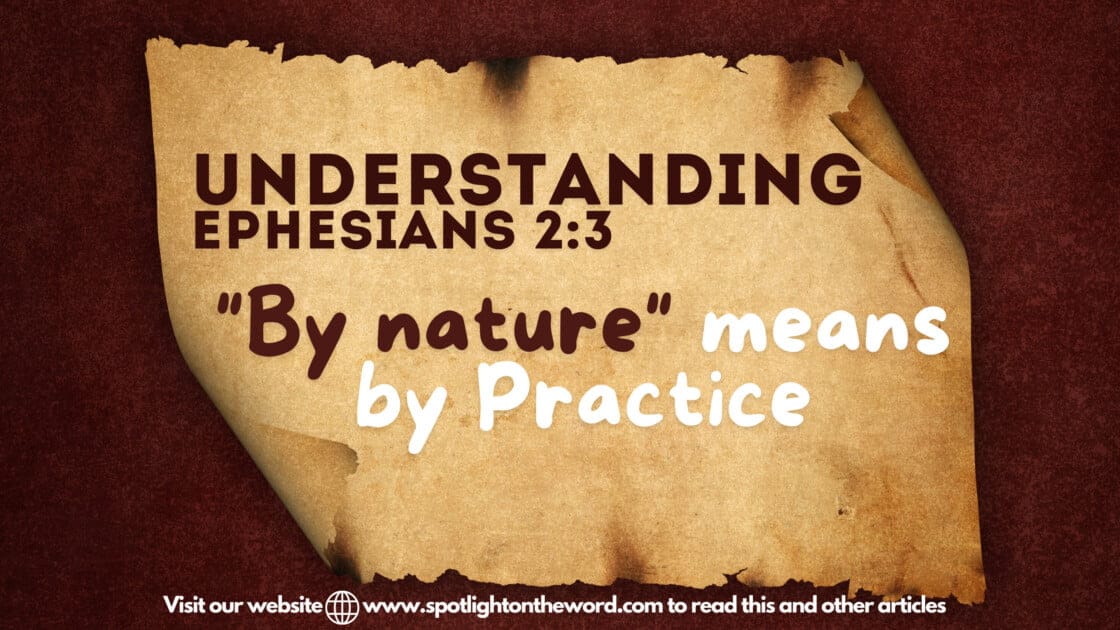Understanding Ephesians 2:3 – “By nature” means by Practice
By: Michael Annan Kasukose
[Ephesians 2:3 serves as a powerful reminder of God’s love, mercy, and the potential for transformation in our lives. It encourages us to embrace our identity in Christ and live in a manner worthy of our calling.]
Introduction
a) Brief overview of Ephesians as a book
The book of Ephesians is a powerful epistle attributed to the apostle Paul, written under divine inspiration. It was originally penned in Koiné Greek[1], the common language of its time, emphasizing that God’s message is accessible to all. Written during Paul’s imprisonment in Rome around A.D. 62, it was addressed primarily to the church in Ephesus, though some suggest it was meant for wider circulation[2].
The central themes of Ephesians include highlighting God’s system of redemption, showcasing the unique blessings found in Jesus Christ, and emphasizing the impartiality of the gospel, welcoming all regardless of background or status. The key verses and phrases, such as “in Christ,[3]” “grace[4],” “walk[5]“, “body[6]” and “love[7],” underscore these themes throughout the epistle.
The main focus of Ephesians is twofold: first, to illuminate the essence of the Church of Christ, and second, to serve as a comprehensive guide or “syllabus[8]” for the New Testament church. It can be broadly categorized into two sections, with chapters 1-3 dealing with doctrinal truths and chapters 4-6 addressing practical Christian living. However, it’s important to note that these divisions, while helpful, are not rigid, as the themes seamlessly interweave throughout the entire book. One of the key passages, Ephesians 4:4-6, beautifully encapsulates the unity and oneness found in the body of Christ.
b) Ephesians 2:3 and its context
Ephesians 2:1 “And you He made alive, who were dead in trespasses and sins,
Ephesians 2:2 in which you once walked according to the course of this world, according to the prince of the power of the air, the spirit who now works in the sons of disobedience,
Ephesians 2:3 among whom also we all once conducted ourselves in the lusts of our flesh, fulfilling the desires of the flesh and of the mind, and were by nature children of wrath, just as the others.”
In the immediate context of Ephesians 2:3, Paul emphasizes the transformative power of God. He illustrates this by contrasting spiritual death with being made alive through grace. Those once spiritually dead are now brought into a new life with Christ, forming a dwelling place for God. This highlights the immense power of God’s resurrection, extending to the spiritual revival of believers.
Contextual Background
a) Historical and cultural context of Ephesians
The historical context of the book of Ephesians is set in the city of Ephesus, a significant hub of commerce, politics, and religion in Western Asia. Ephesus was known for its grandeur, particularly the awe-inspiring temple dedicated to the goddess Artemis[9]. This temple was renowned as one of the Seven Wonders of the Ancient World. The city’s economy was also tied to the sale of silver shrines of Diana. Ephesus was a centre for magical arts and the use of inscribed amulets[10]. Additionally, it was home to a colossal theatre capable of holding over 25,000 spectators, making it the largest Greek-built theatre. Paul ministered in Ephesus, and it was one of the seven churches addressed in the book of Revelation. The city’s prominence in Paul’s ministry is evident through his companions who may have hailed from Ephesus. Today, the ruins of Ephesus stand as a testament to its once-great stature.
The background from the Bible provides a detailed account of Paul’s interactions and teachings in Ephesus. It highlights his initial visit, where he left Aquila and Priscilla and promised to return. Later, Apollos, an eloquent man, was instructed by Aquila and Priscilla, deepening his understanding of the faith. Paul’s subsequent return saw him encountering disciples who only knew John’s baptism. He taught them about Christ, baptized them in Jesus’ name, and imparted the Holy Spirit’s gifts. Paul’s bold preaching in the synagogue faced resistance, leading him to instruct in the school of Tyrannus for about two years, impacting both Jews and Greeks. The account also includes various significant incidents in Ephesus, from miraculous works to confrontations with idol-makers. In his final meeting with the elders, Paul emphasized his faithful preaching and warned of future challenges from false teachers. Lastly, Jesus’ letter to the Ephesian Christians commends their hard work and discernment but urges them to rekindle their initial love for Christ.
b) Paul’s purpose in writing Ephesians
Paul’s letter to the Ephesians addresses key themes regarding a Christian’s identity in Christ and their role in the church. He expresses his desire for them to understand:
- The hope associated with God’s calling (1:18).
- The glorious riches of God’s inheritance in the saints (1:18).
- The immense power available to believers (1:19).
In the first three chapters, Paul elaborates on these spiritual blessings in Christ, while the last three chapters emphasize the behaviour expected of those who have received such blessings. Therefore, Paul’s purpose is twofold:
- To remind Christians of their abundant spiritual blessings in Christ (1:3).
- To encourage them to live in a manner worthy of their calling (4:1).
III. Exegesis of Ephesians 2:3
a) Literal translation and meaning of the verse
In Ephesians 1:16-20, Paul expresses continuous gratitude and prayers for the Ephesians, seeking that they may gain wisdom and revelation from the God of Jesus Christ. He emphasizes the extraordinary power available to believers, demonstrated in the resurrection and exaltation of Christ.
This context sets the stage for Ephesians 2:1-7, where it is explained that, in His boundless love and mercy, God resurrected believers who were spiritually dead due to their sins. They were once enslaved to worldly desires and influenced by disobedient spiritual forces. However, by grace, they were saved and spiritually raised up with Christ. This act of kindness serves to showcase the profound richness of God’s grace throughout future ages.
b) Key terms and their significance
Nature…….phusis[11] — foo’-sis )- from phuo, “to bring forth, produce,” signifies (a) “the nature”
(b) “origin, birth, (c) “the regular law or order of nature,”
- Children of……teknon[12]-is used in both the natural and the figurative senses. It gives prominence to the fact of birth. But simply mean in that one has the exact character of the one who bore him.
iii. Sons of……….huios[13]– “stresses the dignity and character of the relationship” “indicating the quality of that with which it is connected”
- Desires of……..”To will, to wish,” implying volition and purpose, frequently a determination, is most usually rendered “to will[14].”
- of the flesh………….. (h) “The seat of sin in man[15]” (but this is not the same thing as in the body), 2 Peter 2:18; 1 John 2:16;
- And of the mind……….”the faculty of knowing, understanding, or moral reflection[16],” (1) with an evil significance, a consciousness characterized by a perverted moral impulse, Ephesians 2:3
Theological Implications
It highlights that all people, regardless of their past, have the opportunity to be made alive spiritually through God’s mercy and love. It also stresses that this salvation is a gift from God and not something that can be earned through human works. Additionally, it underscores the unity of believers in Christ, breaking down barriers that may have existed in the past.
The theological implications of this passage are rooted in the core Christian beliefs:
- Salvation by Grace through Faith: This passage underscores that salvation is a gift from God, given freely out of His grace. It cannot be earned through human effort but only through what God requires of us to do. Faith here is a living or working or obedient faith and not mere mentally dead acceptance of facts about God.
- Human problem of sin: The passage acknowledges the greatest problem of humanity. It describes people as being “dead in trespasses and sins,” highlighting the need for spiritual rebirth through Christ.
- God’s Love and Mercy: It emphasizes God’s abundant love and rich mercy towards humanity. Despite our love for sin, God’s love for us is the driving force behind our salvation.
- Unity in Christ: The passage speaks to the unifying power of faith in Christ. It breaks down distinctions between people (such as Jew and Gentile) and emphasizes that all believers are brought near to God through the blood of Christ.
- Prepared Good Works: It points out that believers are God’s workmanship, created for good works. This implies that one should keep to living a righteous and obedient life as a response to God’s grace.
- Hope in Christ: Before coming to faith, individuals are described as being without hope and without God. Through Christ, they find hope and reconciliation with God.
In summary, it teaches us doctrine on salvation, emphasizing grace, faith, obedience, and the transformative power of God’s love.
Address common misconceptions or misinterpretations
Some commentators who are Calvinists in their theology, have taken the phrase “children of wrath by nature” to mean this nature is the result of original sin inherited from Adam[17]. For instance:
“Nature,” in Greek, implies that which has grown in us as the peculiarity of our being, growing with our growth, and strengthening with our strength, as distinguished from that which has been wrought on us by mere external influences: what is inherent, not acquired (Job 14:4; Ps 51:5). An incidental proof of the doctrine of original sin- Jamieson-Fausset brown[18]
Also; “And were by nature; not merely by custom or imitation, but by nature as now constituted since the fall”- Matthew Poole’s
Next, “or by nature a sinner, or sin is naturally impressed in him; and hence being by nature a sinner, he is by nature deserving of the wrath of God, as were the persons spoken of”- Gills exposition
Addressing the misapplication of the verse
Regarding the misinterpretation of this verse, a certain writer expressed their viewpoint as follows: “Bible commentators who believe in original sin assert that the term “nature,” when applied to humanity, denotes what is shared by all individuals, distinguishing it from acquired or individual traits. They contend that it can refer to humanity as originally created by God or as it has become due to the “fault and corruption of nature.” In this particular context, they argue, it unequivocally signifies the latter, representing humanity’s state as estranged from God, in contrast to the nature of man restored to their original “image of God” through Jesus Christ.”
Another writer states: “According to this perspective, the passage underscores that in our natural state, due to an inherent inclination towards evil, humans are, by default, considered children of wrath[19]. It is important to note that this viewpoint does not specify precisely when this state initiates, but it emphasizes that prior to conversion, individuals find themselves in a condition that exposes them to divine wrath. Moreover, this interpretation leaves open questions regarding whether this condition arises from personal actions, inherited corruption, or imputed guilt, and refrains from defining when moral agency commences in human life”
Contemporary denominational preachers always misapply this message to mean inherited sinful nature”.
From another credible Bible study:
“By nature the children of wrath: The word “nature”(phusis) here refers to their behaviour of life, not to a spirit they received at birth that was inclined to sin. Paul emphasizes the demeanor of their lives before they became Christians. The word phusisis also used in 1 Corinthians 11:14 where it refers to a custom or common practice of society. Before their conversion, the Ephesians were dead through their own sins (vs 1). They walked according to the way of the world (vs 2). They lived after the lust of the flesh, doing the desires of the flesh. Therefore, what Paul states here in verse 3 is that it was their habit or life-style to live in sin contrary to the will of God. By such living, they were headed for destruction that would result from the wrath of God being poured out on them because of sin (Rm 6:23).
“Because of their habit[20],” i.e. from being habituated to it. This is the only place in the N.T. where this important word ἕξις habitus occurs.
Trained, or disciplined by spiritual practice
In Ephesians 2:3, Paul refers to unregenerate people as “by nature children of wrath.” Some interpret this as support for the doctrine of hereditary total depravity, suggesting humans are born sinful due to Adam’s transgression. However, the passage emphasizes personal sin, stating that spiritual death is a consequence of “your trespasses and sins.” The verb tense suggests a habitual lifestyle of sin before conversion, rather than inherited sinfulness from birth. The middle voice in Greek underscores personal involvement in the sinful condition. The term “nature” could be understood as a habitual mode of feeling and acting. Therefore, Ephesians 2:3 indicates that, in their unregenerate state, the Ephesians had become deserving of God’s wrath through long practice of sin, not through inherent depravity from birth. This interpretation challenges the doctrine of inherited depravity”
VII. Comparisons with Other Bible Passages
i. Romans 2:14
For when the Gentiles, which have not the law, do by nature the things contained in the law, these, having not the law, are a law unto themselves:
Do by nature the things contained in the law means-
- They do by practice the things in the law.
- The Gentiles did not have a written law. However, some of their practices were better than those of the people who had a written law.
ii. Hebrews 5:14
But solid food belongs to those who are of full age, that is, those who by reason of use have their senses exercised to discern both good and evil.
Who by reason of use – Margin, Or, “an habit,” or, “perfection[21].” Coverdale and Tyndale render it, “through custom.” The Greek word means “habit, practice.” The meaning is, that by long use and habit they had arrived to that state in which they could appreciate the more elevated doctrines of Christianity. The reference in the use of this word is not to those who “eat food” – meaning that by long use they are able to distinguish good from bad – but it is to experienced Christians, who by long experience are able to distinguish what is useful in pretended religious instruction from what is injurious. It refers to the delicate taste which an experienced Christian has in regard to those doctrines which impart most light and consolation. Experience will thus enable one to discern what is suited to the soul of man; what elevates and purifies the affections, and what tends to draw the heart near to God.
Have their senses – The word used here means properly “the senses” – as we use the term; the seat of sensation, the smell, taste, etc. Then it means “the internal sense[22],” the faculty of perceiving truth; and this is the idea here. The meaning is, that by long experience Christians come to be able to understand the more elevated doctrines of Christianity; they see their beauty and value, and they are able carefully and accurately to distinguish them from error
To discern both good and evil – That is, in doctrine. They will appreciate and understand what is true; they will reject what is false.
VIII. Personal Reflection and Application
As you reflect on Ephesians 2:3, consider your own journey with faith. Take a moment to think about how you’ve experienced God’s transformative power in your life.
We all have our struggles, those old habits and desires that can sometimes pull us back. But remember, you’re not alone in this journey. You can lean on God’s word for strength. It’s there, always available, to help you overcome those challenges.
Try incorporating daily prayer, reading and meditation on scripture into your routine.
If you have also not become a Christian, know that you still have the opportunity do so. Same Ephesians 1:13; In Him you also trusted, after you heard the word of truth, the gospel of your salvation; in whom also, having believed, you were sealed with the Holy Spirit of promise,”
From the verse above and other verses, steps we need to take to obtain this salvation involves;
- Hearing the Word of truth, the gospel of our salvation (Eph 1:13)
- Believing this gospel (Eph 1:13)
- Repent of sin (Eph 4:21-22)
- Confess Christ
- Be baptized (Eph 5:26)
Conclusion
In conclusion, Ephesians 2:3 serves as a powerful reminder of God’s love, mercy, and the potential for transformation in our lives. It encourages us to embrace our identity in Christ and live in a manner worthy of our calling. This passage beautifully illustrates the hope and reconciliation found in Christ, offering a message of grace and redemption for all who seek it.
References
[1] Russell Haffner, ‘Ephesians’, 2023, p. 9 <https://school.wvbs.org/courses/ephesians/>.
[2] Russell Haffner.
[3] Russell Haffner.
[4] Russell Haffner.
[5] Russell Haffner.
[6] Russell Haffner.
[7] Russell Haffner.
[8] Russell Haffner.
[9] Russell Haffner.
[10] Russell Haffner.
[11] ‘Vines Expository Dictionary’.
[12] ‘Vines Expository Dictionary’.
[13] ‘Vines Expository Dictionary’.
[14] ‘Vines Expository Dictionary’.
[15] ‘Vines Expository Dictionary’.
[16] ‘Vines Expository Dictionary’.
[17] Wayne Jackson, ‘By Nature Children of Wrath’, Christian Courier <https://christiancourier.com/articles/ephesians-2-3-by-nature-children-of-wrath>.
[18] Gills exposition Jamieson-Fausset brown, Matthew Poole, ‘Commentary Ephesians 2:3’, Bible Hub <https://biblehub.com/commentaries/ephesians/2-3.htm>.
[19] Jamieson-Fausset brown, Matthew Poole.
[20] Wayne Jackson.
[21] Barnes Commentary, ‘Hebrews 5:14’, Bible Hub <https://biblehub.com/commentaries/hebrews/5-14.htm>.
[22] Barnes Commentary.






